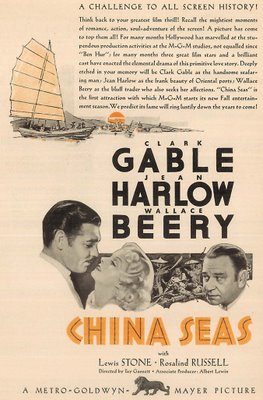
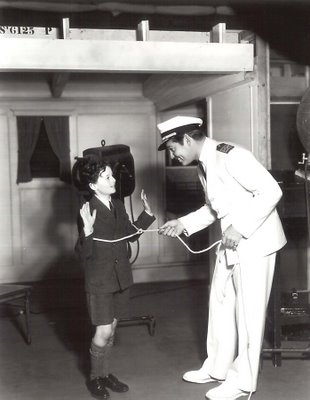 Some Good Gables On DVD
Some Good Gables On DVD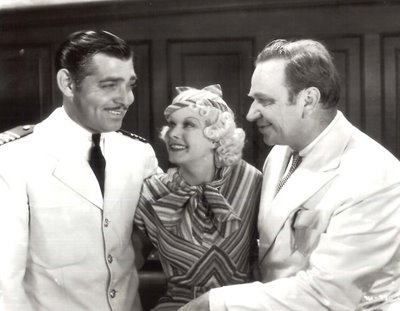 The Clark Gable features in the new Warner DVD box are all pre-war, except Mogambo. That may be as well, for seeing a mix of Gable before and aft can be a little disconcerting. So much of what he represented before WWII would fly in the face of post-war sensibilities and priorities. All those free-wheeling soldiers of fortune had to be contained in this new world, and family obligation was to be preferred over gold prospecting, wildcat oil drilling, and test piloting. Gable the husband and father of Any Number Can Play is a far sight removed from Manhattan Melodrama, even though he plays gamblers in both. The difference lies in the fact that gambling in a post-war environment is something to be ashamed of, and only when Gable chucks the tables and devotes himself to home and hearth can he find happiness. Romance for a post-war Gable also came at a higher price. In Homecoming, his affair with army nurse Lana Turner is an indiscretion for which he’ll pay --- a Gable tryst he’d have laughed off in the early thirties now has grave consequence for the post-warrior. Not that I’m down on the later Gables. For me, they get better with each viewing --- and sometimes, of course, he did play the familiar roustabout, as in To Please A Lady, Lone Star, Key To The City, and the like. None of these have the freshness of that pre-war group, however. Six movies are contained in this DVD box, and I like them all. So far I’ve looked at two, and as often happens with old friends, they play a little differently since our last visit of ten or so years ago.
The Clark Gable features in the new Warner DVD box are all pre-war, except Mogambo. That may be as well, for seeing a mix of Gable before and aft can be a little disconcerting. So much of what he represented before WWII would fly in the face of post-war sensibilities and priorities. All those free-wheeling soldiers of fortune had to be contained in this new world, and family obligation was to be preferred over gold prospecting, wildcat oil drilling, and test piloting. Gable the husband and father of Any Number Can Play is a far sight removed from Manhattan Melodrama, even though he plays gamblers in both. The difference lies in the fact that gambling in a post-war environment is something to be ashamed of, and only when Gable chucks the tables and devotes himself to home and hearth can he find happiness. Romance for a post-war Gable also came at a higher price. In Homecoming, his affair with army nurse Lana Turner is an indiscretion for which he’ll pay --- a Gable tryst he’d have laughed off in the early thirties now has grave consequence for the post-warrior. Not that I’m down on the later Gables. For me, they get better with each viewing --- and sometimes, of course, he did play the familiar roustabout, as in To Please A Lady, Lone Star, Key To The City, and the like. None of these have the freshness of that pre-war group, however. Six movies are contained in this DVD box, and I like them all. So far I’ve looked at two, and as often happens with old friends, they play a little differently since our last visit of ten or so years ago.
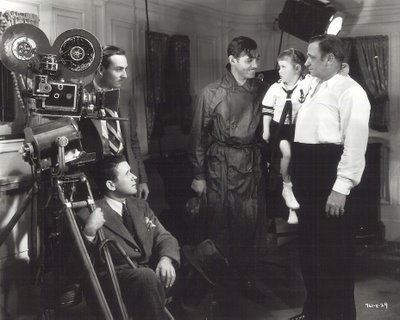
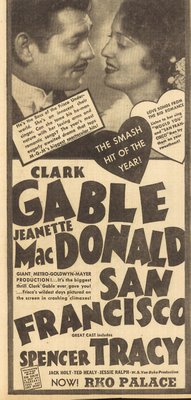 Why would any man want to be mixed up with Jean Harlow in China Seas? She’s obviously trouble from the moment she boards ship --- she’s even indirectly responsible for a number of deaths during a pirate raid she enables. So how does Gable come off proposing to her at the end of this show? The woman’s bad news, pure and simple, and he should know better. I liked Jean in Red Dust. More subdued, but still pre-code brassy and amusing when the situation called for it. This time, she’s scary aggressive, shouts constantly, issues threats and worse, delivers on them. Gable’s preference for limp dishrag Rosalind Russell seems entirely sensible. Don’t misunderstand, however. China Seas still rocks. It’s the kind of picture we think of when it’s time to name a "typical" pre-war Clark Gable vehicle. On and off in 90 minutes, it doesn’t lag. Torture scenes in movies can be unpleasant (as can torture in real life --- seen Batman Begins?), but China Seas has a doozy that’s fun and unsettling at once. That’s where Wallace Beery shines. Everybody’s rough on Beery these days, but when he had the right part, nobody was better. He puts a "Malay Boot" on Gable, then soothes him with an insincere speech about how awful it is to see a man suffer so. A great scene. Wally’s best when he’s dangerous, but deadly when he’s lovable. Stay away from this man when he co-stars with kids or Marjorie Main. Those are toxic combinations. The youthful visitor to the set is Freddie Bartholomew, around the time he was doing Anna Karenina with Garbo. The babe-in-Beery’s arms is his daughter, Carol Ann, who had a small role (and billing) in China Seas.
Why would any man want to be mixed up with Jean Harlow in China Seas? She’s obviously trouble from the moment she boards ship --- she’s even indirectly responsible for a number of deaths during a pirate raid she enables. So how does Gable come off proposing to her at the end of this show? The woman’s bad news, pure and simple, and he should know better. I liked Jean in Red Dust. More subdued, but still pre-code brassy and amusing when the situation called for it. This time, she’s scary aggressive, shouts constantly, issues threats and worse, delivers on them. Gable’s preference for limp dishrag Rosalind Russell seems entirely sensible. Don’t misunderstand, however. China Seas still rocks. It’s the kind of picture we think of when it’s time to name a "typical" pre-war Clark Gable vehicle. On and off in 90 minutes, it doesn’t lag. Torture scenes in movies can be unpleasant (as can torture in real life --- seen Batman Begins?), but China Seas has a doozy that’s fun and unsettling at once. That’s where Wallace Beery shines. Everybody’s rough on Beery these days, but when he had the right part, nobody was better. He puts a "Malay Boot" on Gable, then soothes him with an insincere speech about how awful it is to see a man suffer so. A great scene. Wally’s best when he’s dangerous, but deadly when he’s lovable. Stay away from this man when he co-stars with kids or Marjorie Main. Those are toxic combinations. The youthful visitor to the set is Freddie Bartholomew, around the time he was doing Anna Karenina with Garbo. The babe-in-Beery’s arms is his daughter, Carol Ann, who had a small role (and billing) in China Seas. 

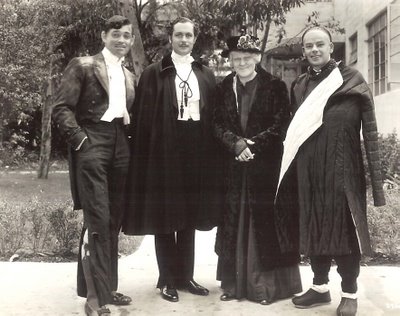 Gable nearly drowns in an ocean of sanctimony during San Francisco, but it isn’t his own. Paragons of rectitude Spencer Tracy (priest) and Jeannete MacDonald (sexless songbird) see to the gelding process, and by movie’s end, our man Blackie Norton is no longer the figure of raffish fun we’ve enjoyed for the preceding two hours. You can really do yourself a favor by turning this one off about five minutes before the end. That way you won’t have to see Blackie literally bend his knee to mid-thirties Code dictates. Audiences then knew how to tune out on the sell-outs. They got to where they could see them coming. Viewers had, in effect, learned how to decode the Code. It was enough to enjoy all the fun that led up to the last reel penance. No one would remember Blackie’s ultimate redemption --- at least they’d try not to. Gable’s so dynamic here that we can’t help deploring the party poopers anxious to bring him around to their pious way of thinking. The lifeblood of this movie resides in him. Maybe it was felt that any character so magnetic and compelling must somehow answer for it. It would happen again with Rocky Sullivan two years later --- indeed Angels With Dirty Faces had almost the identical storyline. Just as I questioned Gable’s judgment in aligning with Harlow in China Seas, so too am I perplexed by his ceaseless attentions to MacDonald in San Francisco. You figure that even if he got her, it won’t have been worth the wait, especially considering the massive effort involved. Part of the problem is Jeanette herself (with Gable here on the set). No longer the lingerie-clad pre-code siren of Love Me Tonight and One Hour With You, here she’s the eternal Miss Touch-Me-Not, bursting into unwelcome song whenever Blackie gets too close (my fast-forward got a workout during those opera scenes). One I like in this show is Ted Healy (that’s him with Gable and MacDonald). He was always the sour apple, wise-ass, splash of cold water to counterbalance conventional folk that populate movies. Ted’s never a villain. Just truculent for the hell of it. He gives the impression of not liking people much. Remember how he smacked the Stooges around? You get a feeling he did it backstage as well. Speaking of Beery again … do you suppose he administered the fatal beating that killed Ted in 1937? There’s persuasive theory he did, and that Metro covered it up. The two supposedly got into words at a bar before Beery took Healy outside and beat his brains out. I told you this man was dangerous. Albert R. ("Cubby") Broccoli was an eyewitness to Healy’s death. Papers said the whole thing was a fight among nameless drunks, and that Ted got the worst of it. His wife Betty never accepted that, but her entreaties to re-open the cursory investigation fell on deaf ears. Above grouping of Metro players with Gable include Robert Montgomery (in costume for Trouble For Two), Lionel Barrymore (same for Devil Doll), and Paul Muni (for The Good Earth). Metro stages were busy beehives in 1936.
Gable nearly drowns in an ocean of sanctimony during San Francisco, but it isn’t his own. Paragons of rectitude Spencer Tracy (priest) and Jeannete MacDonald (sexless songbird) see to the gelding process, and by movie’s end, our man Blackie Norton is no longer the figure of raffish fun we’ve enjoyed for the preceding two hours. You can really do yourself a favor by turning this one off about five minutes before the end. That way you won’t have to see Blackie literally bend his knee to mid-thirties Code dictates. Audiences then knew how to tune out on the sell-outs. They got to where they could see them coming. Viewers had, in effect, learned how to decode the Code. It was enough to enjoy all the fun that led up to the last reel penance. No one would remember Blackie’s ultimate redemption --- at least they’d try not to. Gable’s so dynamic here that we can’t help deploring the party poopers anxious to bring him around to their pious way of thinking. The lifeblood of this movie resides in him. Maybe it was felt that any character so magnetic and compelling must somehow answer for it. It would happen again with Rocky Sullivan two years later --- indeed Angels With Dirty Faces had almost the identical storyline. Just as I questioned Gable’s judgment in aligning with Harlow in China Seas, so too am I perplexed by his ceaseless attentions to MacDonald in San Francisco. You figure that even if he got her, it won’t have been worth the wait, especially considering the massive effort involved. Part of the problem is Jeanette herself (with Gable here on the set). No longer the lingerie-clad pre-code siren of Love Me Tonight and One Hour With You, here she’s the eternal Miss Touch-Me-Not, bursting into unwelcome song whenever Blackie gets too close (my fast-forward got a workout during those opera scenes). One I like in this show is Ted Healy (that’s him with Gable and MacDonald). He was always the sour apple, wise-ass, splash of cold water to counterbalance conventional folk that populate movies. Ted’s never a villain. Just truculent for the hell of it. He gives the impression of not liking people much. Remember how he smacked the Stooges around? You get a feeling he did it backstage as well. Speaking of Beery again … do you suppose he administered the fatal beating that killed Ted in 1937? There’s persuasive theory he did, and that Metro covered it up. The two supposedly got into words at a bar before Beery took Healy outside and beat his brains out. I told you this man was dangerous. Albert R. ("Cubby") Broccoli was an eyewitness to Healy’s death. Papers said the whole thing was a fight among nameless drunks, and that Ted got the worst of it. His wife Betty never accepted that, but her entreaties to re-open the cursory investigation fell on deaf ears. Above grouping of Metro players with Gable include Robert Montgomery (in costume for Trouble For Two), Lionel Barrymore (same for Devil Doll), and Paul Muni (for The Good Earth). Metro stages were busy beehives in 1936.

 Some Good Gables On DVD
Some Good Gables On DVD The Clark Gable features in the new Warner DVD box are all pre-war, except Mogambo. That may be as well, for seeing a mix of Gable before and aft can be a little disconcerting. So much of what he represented before WWII would fly in the face of post-war sensibilities and priorities. All those free-wheeling soldiers of fortune had to be contained in this new world, and family obligation was to be preferred over gold prospecting, wildcat oil drilling, and test piloting. Gable the husband and father of Any Number Can Play is a far sight removed from Manhattan Melodrama, even though he plays gamblers in both. The difference lies in the fact that gambling in a post-war environment is something to be ashamed of, and only when Gable chucks the tables and devotes himself to home and hearth can he find happiness. Romance for a post-war Gable also came at a higher price. In Homecoming, his affair with army nurse Lana Turner is an indiscretion for which he’ll pay --- a Gable tryst he’d have laughed off in the early thirties now has grave consequence for the post-warrior. Not that I’m down on the later Gables. For me, they get better with each viewing --- and sometimes, of course, he did play the familiar roustabout, as in To Please A Lady, Lone Star, Key To The City, and the like. None of these have the freshness of that pre-war group, however. Six movies are contained in this DVD box, and I like them all. So far I’ve looked at two, and as often happens with old friends, they play a little differently since our last visit of ten or so years ago.
The Clark Gable features in the new Warner DVD box are all pre-war, except Mogambo. That may be as well, for seeing a mix of Gable before and aft can be a little disconcerting. So much of what he represented before WWII would fly in the face of post-war sensibilities and priorities. All those free-wheeling soldiers of fortune had to be contained in this new world, and family obligation was to be preferred over gold prospecting, wildcat oil drilling, and test piloting. Gable the husband and father of Any Number Can Play is a far sight removed from Manhattan Melodrama, even though he plays gamblers in both. The difference lies in the fact that gambling in a post-war environment is something to be ashamed of, and only when Gable chucks the tables and devotes himself to home and hearth can he find happiness. Romance for a post-war Gable also came at a higher price. In Homecoming, his affair with army nurse Lana Turner is an indiscretion for which he’ll pay --- a Gable tryst he’d have laughed off in the early thirties now has grave consequence for the post-warrior. Not that I’m down on the later Gables. For me, they get better with each viewing --- and sometimes, of course, he did play the familiar roustabout, as in To Please A Lady, Lone Star, Key To The City, and the like. None of these have the freshness of that pre-war group, however. Six movies are contained in this DVD box, and I like them all. So far I’ve looked at two, and as often happens with old friends, they play a little differently since our last visit of ten or so years ago.

 Why would any man want to be mixed up with Jean Harlow in China Seas? She’s obviously trouble from the moment she boards ship --- she’s even indirectly responsible for a number of deaths during a pirate raid she enables. So how does Gable come off proposing to her at the end of this show? The woman’s bad news, pure and simple, and he should know better. I liked Jean in Red Dust. More subdued, but still pre-code brassy and amusing when the situation called for it. This time, she’s scary aggressive, shouts constantly, issues threats and worse, delivers on them. Gable’s preference for limp dishrag Rosalind Russell seems entirely sensible. Don’t misunderstand, however. China Seas still rocks. It’s the kind of picture we think of when it’s time to name a "typical" pre-war Clark Gable vehicle. On and off in 90 minutes, it doesn’t lag. Torture scenes in movies can be unpleasant (as can torture in real life --- seen Batman Begins?), but China Seas has a doozy that’s fun and unsettling at once. That’s where Wallace Beery shines. Everybody’s rough on Beery these days, but when he had the right part, nobody was better. He puts a "Malay Boot" on Gable, then soothes him with an insincere speech about how awful it is to see a man suffer so. A great scene. Wally’s best when he’s dangerous, but deadly when he’s lovable. Stay away from this man when he co-stars with kids or Marjorie Main. Those are toxic combinations. The youthful visitor to the set is Freddie Bartholomew, around the time he was doing Anna Karenina with Garbo. The babe-in-Beery’s arms is his daughter, Carol Ann, who had a small role (and billing) in China Seas.
Why would any man want to be mixed up with Jean Harlow in China Seas? She’s obviously trouble from the moment she boards ship --- she’s even indirectly responsible for a number of deaths during a pirate raid she enables. So how does Gable come off proposing to her at the end of this show? The woman’s bad news, pure and simple, and he should know better. I liked Jean in Red Dust. More subdued, but still pre-code brassy and amusing when the situation called for it. This time, she’s scary aggressive, shouts constantly, issues threats and worse, delivers on them. Gable’s preference for limp dishrag Rosalind Russell seems entirely sensible. Don’t misunderstand, however. China Seas still rocks. It’s the kind of picture we think of when it’s time to name a "typical" pre-war Clark Gable vehicle. On and off in 90 minutes, it doesn’t lag. Torture scenes in movies can be unpleasant (as can torture in real life --- seen Batman Begins?), but China Seas has a doozy that’s fun and unsettling at once. That’s where Wallace Beery shines. Everybody’s rough on Beery these days, but when he had the right part, nobody was better. He puts a "Malay Boot" on Gable, then soothes him with an insincere speech about how awful it is to see a man suffer so. A great scene. Wally’s best when he’s dangerous, but deadly when he’s lovable. Stay away from this man when he co-stars with kids or Marjorie Main. Those are toxic combinations. The youthful visitor to the set is Freddie Bartholomew, around the time he was doing Anna Karenina with Garbo. The babe-in-Beery’s arms is his daughter, Carol Ann, who had a small role (and billing) in China Seas. 

 Gable nearly drowns in an ocean of sanctimony during San Francisco, but it isn’t his own. Paragons of rectitude Spencer Tracy (priest) and Jeannete MacDonald (sexless songbird) see to the gelding process, and by movie’s end, our man Blackie Norton is no longer the figure of raffish fun we’ve enjoyed for the preceding two hours. You can really do yourself a favor by turning this one off about five minutes before the end. That way you won’t have to see Blackie literally bend his knee to mid-thirties Code dictates. Audiences then knew how to tune out on the sell-outs. They got to where they could see them coming. Viewers had, in effect, learned how to decode the Code. It was enough to enjoy all the fun that led up to the last reel penance. No one would remember Blackie’s ultimate redemption --- at least they’d try not to. Gable’s so dynamic here that we can’t help deploring the party poopers anxious to bring him around to their pious way of thinking. The lifeblood of this movie resides in him. Maybe it was felt that any character so magnetic and compelling must somehow answer for it. It would happen again with Rocky Sullivan two years later --- indeed Angels With Dirty Faces had almost the identical storyline. Just as I questioned Gable’s judgment in aligning with Harlow in China Seas, so too am I perplexed by his ceaseless attentions to MacDonald in San Francisco. You figure that even if he got her, it won’t have been worth the wait, especially considering the massive effort involved. Part of the problem is Jeanette herself (with Gable here on the set). No longer the lingerie-clad pre-code siren of Love Me Tonight and One Hour With You, here she’s the eternal Miss Touch-Me-Not, bursting into unwelcome song whenever Blackie gets too close (my fast-forward got a workout during those opera scenes). One I like in this show is Ted Healy (that’s him with Gable and MacDonald). He was always the sour apple, wise-ass, splash of cold water to counterbalance conventional folk that populate movies. Ted’s never a villain. Just truculent for the hell of it. He gives the impression of not liking people much. Remember how he smacked the Stooges around? You get a feeling he did it backstage as well. Speaking of Beery again … do you suppose he administered the fatal beating that killed Ted in 1937? There’s persuasive theory he did, and that Metro covered it up. The two supposedly got into words at a bar before Beery took Healy outside and beat his brains out. I told you this man was dangerous. Albert R. ("Cubby") Broccoli was an eyewitness to Healy’s death. Papers said the whole thing was a fight among nameless drunks, and that Ted got the worst of it. His wife Betty never accepted that, but her entreaties to re-open the cursory investigation fell on deaf ears. Above grouping of Metro players with Gable include Robert Montgomery (in costume for Trouble For Two), Lionel Barrymore (same for Devil Doll), and Paul Muni (for The Good Earth). Metro stages were busy beehives in 1936.
Gable nearly drowns in an ocean of sanctimony during San Francisco, but it isn’t his own. Paragons of rectitude Spencer Tracy (priest) and Jeannete MacDonald (sexless songbird) see to the gelding process, and by movie’s end, our man Blackie Norton is no longer the figure of raffish fun we’ve enjoyed for the preceding two hours. You can really do yourself a favor by turning this one off about five minutes before the end. That way you won’t have to see Blackie literally bend his knee to mid-thirties Code dictates. Audiences then knew how to tune out on the sell-outs. They got to where they could see them coming. Viewers had, in effect, learned how to decode the Code. It was enough to enjoy all the fun that led up to the last reel penance. No one would remember Blackie’s ultimate redemption --- at least they’d try not to. Gable’s so dynamic here that we can’t help deploring the party poopers anxious to bring him around to their pious way of thinking. The lifeblood of this movie resides in him. Maybe it was felt that any character so magnetic and compelling must somehow answer for it. It would happen again with Rocky Sullivan two years later --- indeed Angels With Dirty Faces had almost the identical storyline. Just as I questioned Gable’s judgment in aligning with Harlow in China Seas, so too am I perplexed by his ceaseless attentions to MacDonald in San Francisco. You figure that even if he got her, it won’t have been worth the wait, especially considering the massive effort involved. Part of the problem is Jeanette herself (with Gable here on the set). No longer the lingerie-clad pre-code siren of Love Me Tonight and One Hour With You, here she’s the eternal Miss Touch-Me-Not, bursting into unwelcome song whenever Blackie gets too close (my fast-forward got a workout during those opera scenes). One I like in this show is Ted Healy (that’s him with Gable and MacDonald). He was always the sour apple, wise-ass, splash of cold water to counterbalance conventional folk that populate movies. Ted’s never a villain. Just truculent for the hell of it. He gives the impression of not liking people much. Remember how he smacked the Stooges around? You get a feeling he did it backstage as well. Speaking of Beery again … do you suppose he administered the fatal beating that killed Ted in 1937? There’s persuasive theory he did, and that Metro covered it up. The two supposedly got into words at a bar before Beery took Healy outside and beat his brains out. I told you this man was dangerous. Albert R. ("Cubby") Broccoli was an eyewitness to Healy’s death. Papers said the whole thing was a fight among nameless drunks, and that Ted got the worst of it. His wife Betty never accepted that, but her entreaties to re-open the cursory investigation fell on deaf ears. Above grouping of Metro players with Gable include Robert Montgomery (in costume for Trouble For Two), Lionel Barrymore (same for Devil Doll), and Paul Muni (for The Good Earth). Metro stages were busy beehives in 1936.
Something that surprised me about San Francisco is that seventy years later, the earthquake effects remain very convincing, at least in part because they lack the distracting air of unreality that the CGI effects glutting movies today tend to have. The effects in San Francisco are physical and very real.
ReplyDeleteAnd on a side note, Jeanette's very staid, very proper rendition of the title song isn't a touch on Judy Garland's version, which was one of her rafter-rattling specials